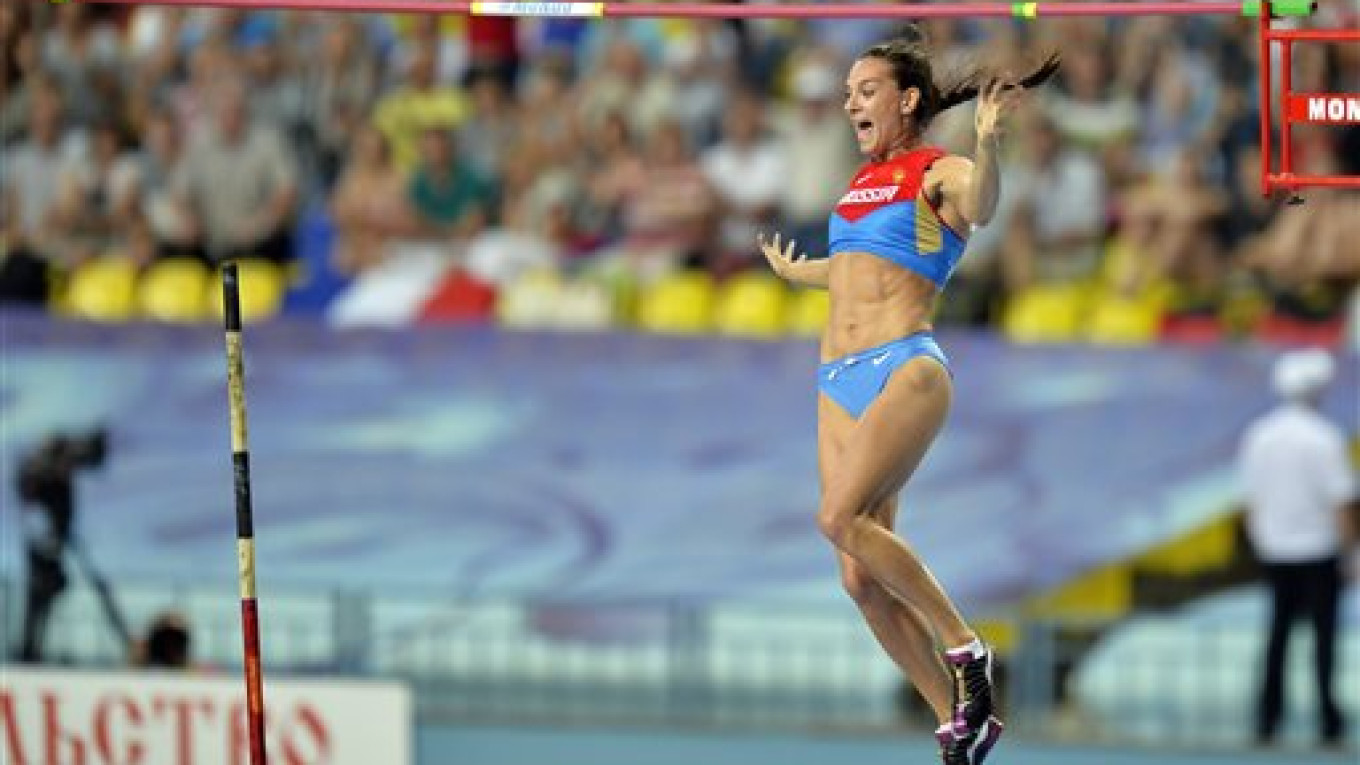BUENOS AIRES, Argentina — The IOC will consider dropping Russian pole vault star Yelena Isinbayeva as an Olympic ambassador following her comments about gay people, IOC president Jacques Rogge said.
In his final solo news conference as head of the International Olympic Committee, Rogge also said the IOC has no power to influence Russia on the anti-gay legislation that has provoked an international outcry ahead of February's Winter Games in Sochi.
"One should not forget that we are staging games in a sovereign state and that the International Olympic Committee cannot be expected to have an influence on sovereign affairs of a country," Rogge said Wednesday.
Two-time Olympic pole vault champion Isinbayeva spoke in defense of Russia's law against gay "propaganda" after winning the title at last month's world championships in Moscow.
Isinbayeva condemned homosexuality, saying Russians have "normal" heterosexual relations, and criticized two Swedish athletes who painted their fingernails in rainbow colors in support of gay rights. The next day, Isinbayeva said her comments in English may have been misunderstood and that she is against any discrimination.
Her initial comments appeared to go against the IOC ideals and the promotional role she has held since 2010 as an ambassador for the Youth Olympics. Isinbayeva is also the "mayor" of one of two Olympic villages in Sochi, an honorary but symbolic and visible role.
Asked whether it was appropriate for Isinbayeva to remain as an Olympic ambassador, Rogge gave his first public indication that she could be removed from the role.
"This is something we will consider in due time," he said.
Russia's law prohibiting promotion of "nontraditional" sexual relations has been denounced by activists and criticized by President Barack Obama. Activists have called for a boycott of the Sochi Games, although Obama and British Prime Minister David Cameron have ruled that out.
Rogge reiterated that the IOC has received assurances from the Russian government that it would abide by the Olympic Charter and that the law will not discriminate against athletes and spectators in Sochi.
Rogge was asked whether the IOC has a moral obligation to speak out strongly on such issues with host countries.
"We have clearly, on various occasions, expressed our view on situations in countries, but we are restricted in our power and our actions by the fact that we are the guest of a sovereign country where we hold the games," he said.
Rogge said preparations were on track for the Sochi Games, with only "fine-tuning" left before the opening ceremony on Feb. 7.
"We are very optimistic," he said. "Sochi will be ready."
Rogge was more cautious about the buildup for the 2016 Olympics in Rio de Janeiro, which have been dogged by various construction delays.
"It's evident that there are very tight deadlines which will have to be respected," he said. "There is a lot of infrastructure where the construction has to be speeded up. I'm optimistic that everything will be ready for the test events, but the time is going very fast."
Rogge spoke at a news conference after chairing his final executive board meeting as IOC president. The 71-year-old Belgian is completing 12 years in office, with his successor to be elected Tuesday from among six candidates.
Rogge said he was bowing out "without any nostalgia."
"I did my duty," he said. "I did what I had to do. If it has benefited the IOC, I'm happy."
A Message from The Moscow Times:
Dear readers,
We are facing unprecedented challenges. Russia's Prosecutor General's Office has designated The Moscow Times as an "undesirable" organization, criminalizing our work and putting our staff at risk of prosecution. This follows our earlier unjust labeling as a "foreign agent."
These actions are direct attempts to silence independent journalism in Russia. The authorities claim our work "discredits the decisions of the Russian leadership." We see things differently: we strive to provide accurate, unbiased reporting on Russia.
We, the journalists of The Moscow Times, refuse to be silenced. But to continue our work, we need your help.
Your support, no matter how small, makes a world of difference. If you can, please support us monthly starting from just $2. It's quick to set up, and every contribution makes a significant impact.
By supporting The Moscow Times, you're defending open, independent journalism in the face of repression. Thank you for standing with us.
Remind me later.


